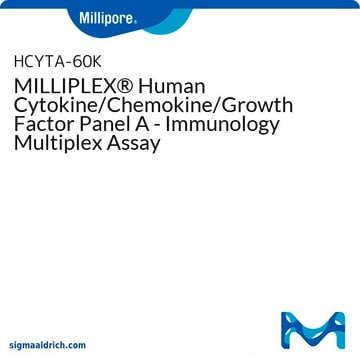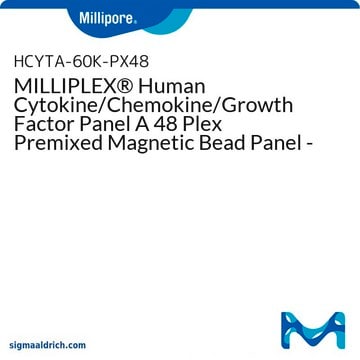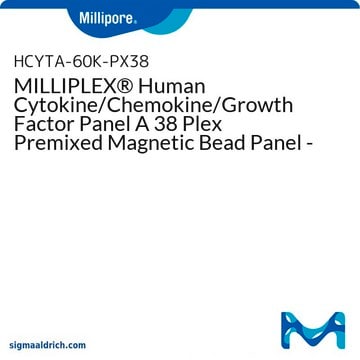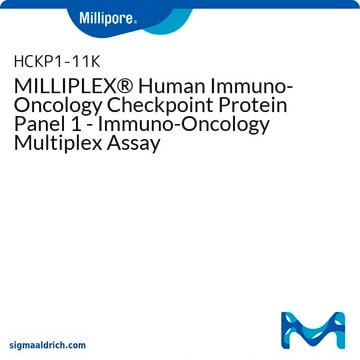HTH17MAG-14K
MILLIPLEX® Human TH17 Magnetic Bead Panel - Immunology Multiplex Assay
Simultaneously analyze multiple Th17 cytokine and chemokine biomarkers with the Th17 Bead-Based Multiplex Assays using the Luminex technology, in human serum, plasma and cell culture samples.
Synonym(s):
Human Th17 cytokine multiplex kit, Luminex® human Th17 cytokine immunoassay, Millipore human Th17 cytokine panel
About This Item
Recommended Products
Quality Level
species reactivity
human
manufacturer/tradename
Milliplex®
assay range
accuracy: 79-107%
standard curve range: 1-5000 pg/mL
(IL-10)
standard curve range: 10-40,000 pg/mL
(IFNγ)
standard curve range: 12-50,000 pg/mL
(IL-17A & IL-2)
standard curve range: 24-100,000 pg/mL
(IL-17 & IL-4)
standard curve range: 3-10,000 pg/mL
(IL-6 & TNFα)
standard curve range: 336-1,500,000 pg/mL
(IL-23)
standard curve range: 37-150,000 pg/mL
(IL-22 & TNFβ)
standard curve range: 488-2,000,000 pg/mL
(IL-17E/IL-25)
standard curve range: 49-200,000 pg/mL
(IL-28a & IL-31)
standard curve range: 5-20,000 pg/mL
(MIP-3α, IL-1β, IL-12 (p70), IL-15, IL-21 & IL-33)
standard curve range: 6-25,000 pg/mL
(IL-5)
standard curve range: 61-250,000 pg/mL
(GM-CSF & IL-27)
standard curve range: 7-30,000 pg/mL
(IL-13)
standard curve range: 9-35,000 pg/mL
(IL-9)
technique(s)
multiplexing: suitable
detection method
fluorometric (Luminex xMAP)
shipped in
wet ice
General description
Th17 cells are involved in the clearance of extracellular bacteria and fungi. They are abundant in the intestinal lamina propria and function as a barrier against invading pathogens. Excessive amounts of Th17 cells have been implicated in the pathogenesis of several autoimmune diseases, including multiple sclerosis, psoriasis, juvenile diabetes, rheumatoid arthritis, Crohn′s disease, and autoimmune uveitis. In addition, Th17 cells play an important role in tumor development, progression, and metastasis, potentially in both promoting and inhibiting tumor growth.
MILLIPLEX® Human TH17 Bead Panel is a 25-plex kit to be used for the simultaneous quantification of the following analytes in serum, plasma or culture supernatant samples: GM-CSF, IFN-γ, IL-1β, IL-2, IL-4, IL-5, IL-6, IL-9, IL-10, IL-12 (p70), IL-13, IL-15, IL-17A, IL-17F, IL-17E/IL-25, IL-21, IL-22, IL-23, IL-27, IL-28A, IL-31, IL-33, MIP-3α/CCL20, TNF-α and TNFβ.
The Luminex® xMAP® platform uses a magnetic bead immunoassay format for ideal speed and sensitivity to quantitate multiple analytes simultaneously, dramatically improving productivity while conserving valuable sample volume.
Panel Type: Cytokines/Chemokines
Specificity
Cross-reactivity between the antibodies and any of the other analytes in this panel is non-detectable or negligible.
Application
- Analytes: GM-CSF, IFN-γ, IL-1β, IL-2, IL-4, IL-5, IL-6, IL-9, IL-10, IL-12 (p70), IL-13, IL-15, IL-17A, IL-17F, IL-17E/IL-25, IL-21, IL-22, IL-23, IL-27, IL-28A, IL-31, IL-33, MIP-3α/CCL20, TNF-α, TNFβ
- Recommended Sample type: Serum, plasma, and cell culture samples
- Recommended Sample dilution: Neat
- Assay Run Time: Overnight
- Research Category: Inflammation & Immunology
Features and Benefits
Storage and Stability
Other Notes
Legal Information
Disclaimer
Signal Word
Danger
Hazard Statements
Precautionary Statements
Hazard Classifications
Acute Tox. 4 Dermal - Acute Tox. 4 Inhalation - Acute Tox. 4 Oral - Aquatic Chronic 2 - Eye Dam. 1 - Skin Sens. 1 - STOT RE 2
Target Organs
Respiratory Tract
Storage Class Code
10 - Combustible liquids
Certificates of Analysis (COA)
Search for Certificates of Analysis (COA) by entering the products Lot/Batch Number. Lot and Batch Numbers can be found on a product’s label following the words ‘Lot’ or ‘Batch’.
Already Own This Product?
Find documentation for the products that you have recently purchased in the Document Library.
Related Content
See how multiplexing the inflammation signaling pathway with MILLIPLEX® inflammation assays or cell signaling assays can help researchers bridge the gap between immunology and cell signaling, including investigating T cell signaling, Th Cell differentiation, inflammatory response signaling, and sepsis signaling.
See how multiplexing the inflammation signaling pathway with MILLIPLEX® inflammation assays or cell signaling assays can help researchers bridge the gap between immunology and cell signaling, including investigating T cell signaling, Th Cell differentiation, inflammatory response signaling, and sepsis signaling.
See how multiplexing the inflammation signaling pathway with MILLIPLEX® inflammation assays or cell signaling assays can help researchers bridge the gap between immunology and cell signaling, including investigating T cell signaling, Th Cell differentiation, inflammatory response signaling, and sepsis signaling.
See how multiplexing the inflammation signaling pathway with MILLIPLEX® inflammation assays or cell signaling assays can help researchers bridge the gap between immunology and cell signaling, including investigating T cell signaling, Th Cell differentiation, inflammatory response signaling, and sepsis signaling.
Our team of scientists has experience in all areas of research including Life Science, Material Science, Chemical Synthesis, Chromatography, Analytical and many others.
Contact Technical Service












